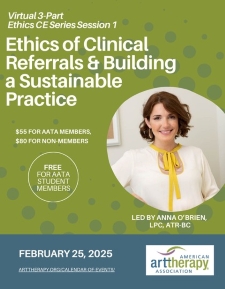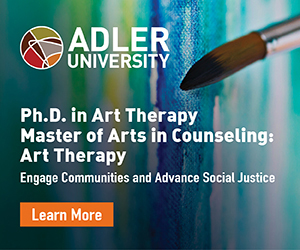 |
||||||||||||||||||||
| Archive | Subscribe | Advertise | arttherapy.org | ||||||||||||||||||||
Join us Tues., Feb. 25, for the first session in our 2025 Ethics CE Series. Presenter Anna O’Brien, LPC, ATR-BC, will explore ethical clinical practices aiming to answer questions like:
Plus, the session will include a guided snowflake-making art-experiential to further explore how every client and situation is unique — requiring flexibility, self-awareness, and a robust referral process. The other two sessions in the series will take place April 22 and 29 and will focus on ethical use of social media and self-disclosure.
Dear AATA community: In times of uncertainty and upheaval, we recognize the profound impact that societal and political events have on mental health. Many in our community are experiencing distress, fear, and frustration as they navigate the challenges unfolding around us. As an association committed to the well-being of our members and those they serve, we acknowledge the depth of these concerns. We believe that Diversity, Equity, and Inclusion (DEI) are core to our organization’s vision and values — and critical to Americans’ access to health care, including mental health care. While statements of solidarity are important, we are committed to taking action that creates lasting and meaningful support. Our focus remains on equipping our community with resources you can find in the MyAATA forum, as well as education and advocacy tools that foster resilience and empowerment.
As we honor Black History Month, we celebrate the Black visionary architects of art therapy. This February, AATA is offering an inspiring virtual Continuing Education session, Black History Continues – The Future of the Field, at no cost to all AATA Members. Non-members are welcome to watch this session at a discounted rate of $30. Participants may earn 1.5 CE credits. Hosted by Louvenia Jackson, PhD, LMFT, ATR-BC, and a panel of Black art therapy students, the session introduces legendary Black art therapists. The panelists also share their experiences as Black art therapy students and their vision of the future of the field.
"I feel so hopeful and encouraged about the way the art therapy field has evolved in its inclusion of race, diversity, and social justice in its training of art therapists and art therapy professionals. I would like to see more of that. Ten years ago, questions about race and diversity were not even encouraged in art therapy conversations, or were spoken in whispers in corners, and I hope we never go back to that. I hope we stand firm in our inclusion of diversity and equity in our training, textbooks, articles, conferences, and practice. As art therapists, we must be more than allies — we need to be ‘co-conspirators’ and ‘accomplices’ to refute oppression and injustices, and advocate to protect our most vulnerable and racially/ethnically targeted communities around us today.”
On Feb. 3, AATA and more than 60 other organizations signed onto a letter written by the Mental Health Liaison Group (MHLG) introducing ourselves to the House Energy and Commerce Committee of the new Congress, reminding the committee members of the importance of federally funded mental health and substance use disorder (SUD) programs and services, which it oversees. The letter also emphasized the role of MHLG and its member organizations as critical resources in creating, passing, and implementing bipartisan mental health and SUD policies.
Kansas State Representative Susan Ruiz introduced HB2072, which would create a Licensed Clinical Art Therapist and Licensed Professional Art Therapist licenses with the support of the Kansas Art Therapy Association. The bill has now been referred to the Health and Human Services Committee. Please contact your representative (especially if they are a member of the committee) to ask them to co-sponsor HB2072 and pass it out of committee. You can find out who your representative is here. Use this model letter for Kansans to help you write your lawmaker about the bill.
Art therapists, including members from the North Texas and South Texas Art Therapy Associations, and the nonprofit Dallas Art Therapy, are working closely with Senator West to advocate for SB1081, which would create a Licensed Associate Art Therapist and Licensed Professional Art Therapist licenses. Please contact your state senator and ask them to co-sponsor SB1081. You can find out who your lawmaker is here and see pictures from their September Hill Day here. Use this model letter for Texans to help you to help you write your lawmaker about the bill.
Join the Minnesota Art Therapy Licensure Coalition on Sat., Mar. 1, from 1-4 p.m. at the The Justin Center for their Day on the Hill Prep Party to write thank you postcards and make swag bags for legislators. The Prep Party is a great opportunity to learn more about licensure efforts, get some swag, and gather with art therapists for an afternoon of togetherness! Then, join them again for their official Day on the Hill (DOTH), Tues., Mar. 4, 8-4 p.m., at the State Capitol Complex. Anyone interested in attending should sign up for a DOTH shift here.
Mark your calendars for LCAT Advocacy Day in Albany, NY, on Monday, March 10, to help advocate for LCATs in New York to receive insurance reimbursement. Currently, the Coalition is advocating for LCATs to be added to the Medicaid Provider List through the state budget. The Coalition is also advocating for bills A3319 and S1001, which would include outpatient care provided by creative arts therapists in certain insurance policies. All are welcome to join, including LCATs, CAT-LPs, students/interns, other licensed professionals, and even community supporters. If you don’t have a car, don’t worry; 1199SEIU is generously providing bus transportation from several locations! You can reserve a spot on the advocacy day sign-up sheet!
This special issue seeks to provide a platform for innovative research, case studies, theoretical explorations, and professional practice viewpoints that deepen our collective knowledge of how art therapy can support neurodivergent individuals. We welcome original articles, theoretical papers, brief reports, and case studies including but not limited to:
Featuring AATA Members Bridget Pemberton-Smith and Meera Rastogi. Source: University of Cincinnati News
|
||||||||||||||||||||
|
The AATA's Art Therapy Today includes a digest of the most important news selected for the AATA from thousands of sources. Guest articles may be submitted to info@arttherapy.org. Publication of any guest article is at the sole discretion of the AATA. The opinions expressed and/or contents of guest articles, advertisements, and external links included in any AATA publication do not represent the positions or policies of the AATA. The AATA makes no warrenty or representation concerning the accuracy of such content. |
||||||||||||||||||||






